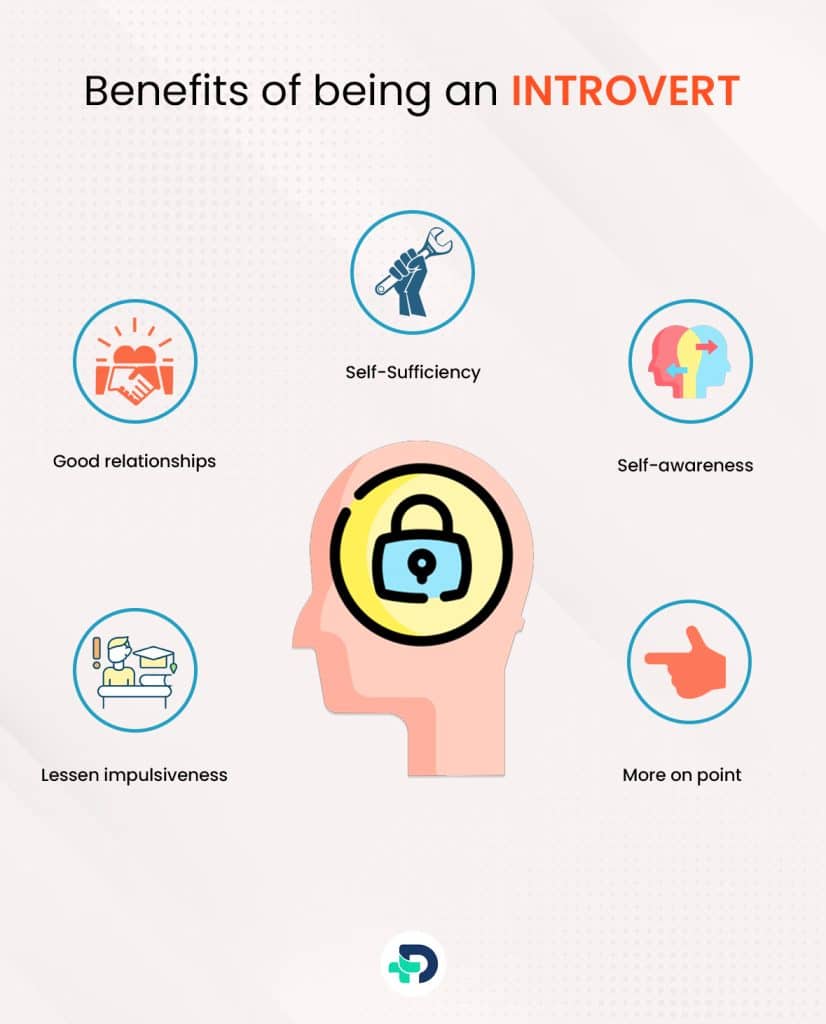Introversion: What do In Need to Know?

- Introversion
- 22 Aug 2023
Overview
About Introversion
Introversion is a psychological predilection or personality trait that describes individuals who gather energy from calm reflection and alone time.
Being more engaged in one’s own inner thoughts and feelings than the outside world involving people, places, and things is a sign of introversion 1Overview| Researched based study from Nlm.nih.gov Introverts are often more quiet and contemplative than extroverts, who have a tendency to be more vocal and clubby.
The ideas of introversion and extroversion were originally put forward by Swiss psychiatrist and psychotherapist Carl Jung.

Symptoms
Signs & Symptoms of Introversion
When you look at the traits of introverts and extroverts, it might be easy to tell where you are on the scale.
- Less of an interest in being social
- Less Confident Communication Skills
- Making decisions with more thought
- More self-reflective and self aware
- Valuing time alone
- Try not to be the focus of attention
- It takes time to open up
Less of an interest in being social
- Introverts are interested in social, family, and love connections, but they won’t rely on them as much as extroverts do. Introverts tend to be more shy and quiet around other people.
- You might be an introvert if you like going to parties and other social events but get tired of talking to people and being in a crowd fast.
Less Confident Communication Skills
- When with a small group of well-known friends, an introvert’s conversation style and skills will change to be more outgoing. This can make it hard to figure out what kind of person they are.
Making decisions with more thought
- If you don’t make quick choices or act on the spur of the moment, this could be a sign of introversion. Introverts take their time to carefully consider all of their alternatives before making a decision.
More self-reflective and self aware
- Introverts tend to look inward and think a lot about themselves, their wants, and their situations.
- They don’t just think about themselves; they also think about how their acts will affect the people around them. Because of this, introverts often seem more polite and helpful.
Valuing time alone
- Introverts need time alone to get their energy back, and they also like being alone. Most introverts have lots of things they love to do when they’re alone and they don’t usually feel bored.
Try not to be the focus of attention
- Even though not all introverts are shy or socially nervous, most of them don’t like being the center of attention.
It takes time to open up
- If they are shy, it might be hard for them to talk to people they just met. Introverts need a little more time than extroverts to calm down and feel safe around other people.3Symptoms| Researched based study from Simplypsychology.org
- Thus, another sign of introversion is being a little shy, private, or slow to warm up to people.
Causes
Causes of Introversion
A complex combination of genetic, environmental, and psychological variables results in the development of introversion.
Genetic predisposition
- Research shows that introversion is partly inherited. A person’s personality and mood characteristics, especially their tendency for introversion or extroversion, may be influenced by certain genes.
Neurotransmitters and brain structure
- Introverts may have more activity in the prefrontal cortex of the brain that is responsible for self-reflection and thinking about oneself.
- Dopamine and serotonin neurotransmitters also contribute to the development of introverted inclinations.
Experiences throughout childhood
- A person’s personality development may be influenced by their upbringing and parenting methods. Children who struggle with social anxiety or who have introverted parents may be more inclined to exhibit these characteristics in themselves.
Environmental factors
- Introversion may also be influenced by a person’s upbringing. As a coping mechanism, someone who repeatedly feels overwhelmed or lives in uncomfortable social settings could come to favor isolation.
Cultural factors
- Personality characteristics may also be influenced by cultural expectations and social standards. People who prefer isolation or introspection place a high importance on assertiveness and friendliness.4Causes| Researched based study from Sagepub.com
Personality
- Some people are prone to introversion by their psychological makeup from birth. For instance, a youngster that is very sensitive to stimuli may be more prone to show introverted inclinations
Adaptive strategies
- Another coping strategy for stress or emotional difficulties is introversion. Some people may turn to seclusion for comfort and restoration, developing introverted traits as a result.
Being introverted is not a bad quality; rather, it is one of the numerous ways that individuals express their uniqueness.
Benefits

Benefits of being an Introvert
Contrary to what most people think, there are some good things about being an introvert:
Self-sufficiency
- People who are introverted usually do things their own way. In times of crisis, introverts might benefit from having a high level of independence and self-sufficiency.
Good relationships
- Introverts may take longer than extroverts to meet and greet people. When they do, they usually have excellent ties with a select group of reliable individuals.
Self-awareness
- Introverts often spend a lot of time in their own “world” of thoughts, feelings, and physical experiences. This can help them learn more about themselves and think about how they can grow and get better in the future.
Lessen impulsiveness
- Some studies show that introverts are less likely to act on a whim than extroverts. In turn, this might make you less likely to do dangerous things or become addicted.
More on point
- Introverts are often better able to keep their attention on the job at hand and not let anything else get in the way. This could be because they try to think more before doing or saying something.
Disadvantages
Disadvantages of being an Introvert
There are also some problems that come with being introverted. You may have to deal with:
Loneliness
- Researchers have found that introverts are much more lonely than extroverts. Being alone can hurt both your mental and physical health in a number of ways.
- Even if you like being alone, try not to shut yourself off. Don’t forget to spend regular, good time with your family and friends.
Unfavorable feelings
- Studies have shown that introversion is linked to more sadness, depression, and having less control over your feelings. If your sadness won’t go away, talk to a doctor.
Inability to express oneself
- Some people don’t like being strong-willed. This can make them feel like they are being used or undervalued.
Misconceptions
- People often make introverts feel like they don’t understand them, both at work and in social settings. Some people mistake being shy for being unfriendly, less smart, or less skilled. You can, however, try to get out of your safe zone and talk to more people to show them who you really are.
Taking less risks
- Compared to extroverts, introverts tend to be less risky and more careful. There are times when it’s a good idea to play it safe. Try to push yourself to take chances that you can handle so you can reach your full potential.
Types
Types of Introversion
It’s important to know that introversion is a range, and people can show a mix of the following types:
Social introversion
- People who are socially introverted would rather be alone or with a small group of close friends. They might find big groups of people tiring and feel more at ease in smaller, quieter groups.1Types| Researched based study from Nlm.nih.gov
Thinking introversion
- This kind of introversion is marked by a tendency to focus on one’s own thoughts and ideas. People who are introverted like to do things alone that give them time to think, reflect, or work on artistic or intellectual projects.
Anxious introversion
- This type of introversion is called “anxious introversion” because people with it are shy or have social anxiety. They may want to talk to other people but find it hard because they are afraid of being judged, criticized, or feeling weird.
Reserved introversion
- Reserved introverts are usually quiet people who don’t share their thoughts or feelings with others easily. They think a lot about themselves and need more time to think about something before they say something.
Introspective introversion
- People who are introverted and reflective tend to be very self-aware and focused on themselves. They may think a lot about themselves and often wonder what their role is and what life is all about.
Sensory introversion
- Sensory introverts are very sensitive to things like noise, bright lights, or being in a busy place. They might feel too much stimulation and want to go somewhere quieter and calmer.
It’s important to remember that these types of introversion are not fixed groups. Many people may show a mix of these traits based on the situation.
Living with
Tips for living with Introversion
Like so many other traits, being an introvert is only a problem if you see it that way. Introverts can do well if they accept their personality style and focus on the good things about it.
Some of the best ways for a shy to get ahead are:
- Admit that you’re an introvert
- Keep in touch with the rest of the world 2Living with| Researched based study from Nlm.nih.gov
- Find Jobs and fun things to do that go together
- Look for relationships with a good balance
- Figure out what role anxiety plays
Myths
Misconceptions about Introversion
Even though more people are learning about introversion, there are still many myths about it. Some popular misunderstandings include:
Introverts are shy and nervous
- Even though some introverts may be shy, being an introvert is not the same thing as having social anxiety. Introverts can be outgoing and good at making friends, but they may prefer better connections or small groups.
Shyness & Introversion are same
Introversion is often misunderstood as shyness or social anxiety by many individuals. Introversion and shyness exhibit both similarities and differences.
- Many introverts are independent and self-confident. They might just prefer to work alone instead of in groups. Some introverts like to be alone, but they can get along well with other people when the situation calls for it.
- On the other hand, shy people avoid social situations because they are afraid, self-conscious, or anxious about being around other people. People who are shy may want to speak up and talk to others more but are afraid to do so.
Introverts don’t like being around people
- Introverts do like to be around other people, but they like to do it in a different way than extroverts do. They might do better in small groups where they can have deep, logical discussion than in big groups where everyone talks about the same things.
Introverts don’t work well on a team
- Introverts can work well with others and make big contributions to group projects. They might like to work in smaller groups or take time to think about their ideas before telling others about them.
Introverts tend to be quiet
- Even though introverts tend to be quieter in some situations, they can be vocal and lively when the time is right. Their self-reflection and thinking don’t mean that they are lazy or don’t care.
Being introvert is a weakness
- Introversion is not a problem; it’s a trait that has its own benefits. Introverts often do well in careers that involve creativity, fixing problems, and deep analysis.
Extroversion versus Introversion
- Extroversion is a personality trait that is marked by a desire for social interactions and outside stimuli. Extroverts like to be around other people and do best in busy, exciting places. They often feel at ease in big groups of people and can adjust quickly to new situations. and enjoy working in groups and doing projects with other people.
- Introversion, on the other hand, a personality trait that means you like being alone and thinking about yourself. Introverts tend to feel more comfortable in places that are quieter and have less going on. They can feel overwhelmed by big groups and busy places, which makes them want to be alone to regain their energy.4Myths| Researched based study from Sagepub.com
Takeaway
Key Takeaways
- Extroversion and introversion are two different and important personality traits that affect how people connect with the world and get their energy.
- While extroverts do well in groups and get energy from outside sources, introverts prefer to be alone and think about themselves to get their mental and emotional energy back up.
- Accepting and knowing these different personality types makes the world a more accepting and helpful place. It also shows that both extroverts and introverts have strengths that are important to society.
Any feedback on this article?
 This Articles content was accurate
This Articles content was accurate Very Informative Article
Very Informative Article I have a question or a comment
I have a question or a comment
 This article contains inaccurate content
This article contains inaccurate content This article was not helpful
This article was not helpful I have a question or a comment
I have a question or a comment
We appreciate your helpful feedback!
Checkout our social pages
References
-
National Library of Medicine
Introversion and Social Engagement: Scale Validation, Their Interaction, and Positive Association With Self-Esteem | Overview | Types
-
National Library of Medicine
Introversion and extroversion: implications for depression and suicidality | Living with
-
Simply Psychology
Signs Of An Introvert Personality: Types, Traits & Characteristics | Symptoms
-
SAGE Journals
Shyness, Self-Construal, Extraversion–Introversion, Neuroticism, and Psychoticism: A Cross-Cultural Comparison Among College Students | Causes | Myths

































